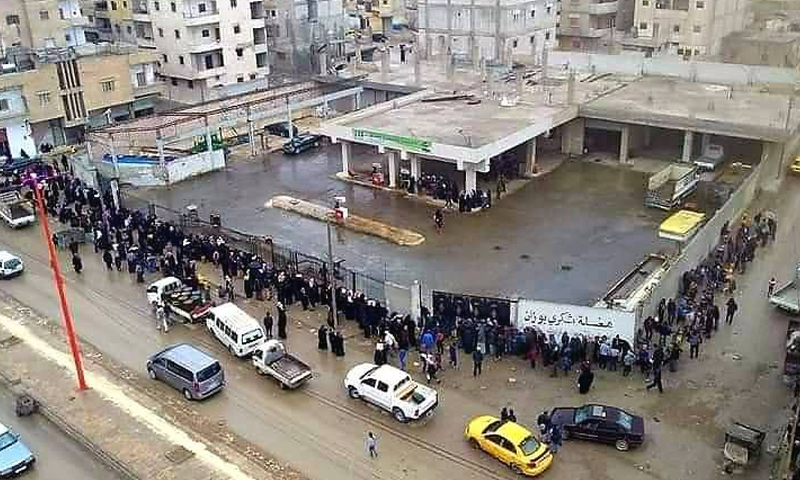Raqqa – Hussam al-Omar
“Wherever you go, you see queues as if these waiting lines have become the daily respiration of people,” says Saleh Mohammed, 45, describing the condition of most of the residents in northeastern Raqqa city since February, following a serious fuel crisis caused by the Autonomous Administration’s ban on fuel kiosks.
From the early morning hours, Mohammed has to head towards the Sadcob station in the northwestern outskirts of Raqqa to occupy an advanced position in the queue before the start of the distribution process that usually starts at 8 a.m., he told Enab Baladi.
Over the past few weeks, Raqqa has been besieged by a stifling fuel crisis amid a lack of oil derivatives following a decision taken by the Autonomous Administration of North and East Syria (AANES) to remove and prevent sporadic fuel stalls.
Enab Baladi viewed long queues in front of petrol stations in the city of Raqqa. Sadcob station was the busiest, followed by Shukri Buzan, al-Shorta (Police), and Abu Heif stations.
Half-day in queuing line
Mohammed, who works as a minibus driver, wastes more than half of his working day waiting in line for fuel and the other half transporting passengers between Raqqa and Kasarat neighborhood.
Mohammed bemoans what he described as the “Bastat days’’ when fuel was available in the black market despite its expensive price that doubled the price set by AANES.
Why were fuel kiosks removed?
An employee of the Raqqa Fuel Directorate, who declined to be named since he was not authorized to report to the media, said the decision to remove fuel kiosks (Arabic colloquial: Basta) was an “inevitable decision to halt the domestic smuggling operations that exhaust the fuel sector in the areas of the Autonomous Administration.”
A liter of diesel is sold at petrol stations at 410 Syrian pounds (11 US cents), while its price on the black market has reached 1,300 SYP (45 US cents) and is sold far away from the eyes of the Autonomous Administration or the customs patrols responsible for removing the stalls.
The employee in the Fuel Directorate assures that the fuel crisis in Raqqa is a matter of time; it will gradually end after all fuel stations come into operation in the near future.
The General Customs Administration in the Autonomous Administration of North and East Syria issued a decision in November 2021 to eliminate all fuel kiosks and unlicensed fuel sales outlets.
The removal decision gave the owners a 15-day deadline, starting from the date of issuing the decision, threatening to enforce the smuggling law on violators and refer them to the courts.
In June 2021, Mohammed Sadeq Ameen, the Co-Chair of the General Petroleum Department, told the North-Press website about a meeting that will discuss how to combat unlicensed fuel trade and to limit sales only to petrol stations in northeastern Syria.
The oil-rich northeastern region has been affected by the long years of armed conflict where many oil wells were damaged, or its productivity has been reduced.
Despite strenuous efforts of the Autonomous Administration to control the fuel crisis, it seems that it is unable so far, amid fears that the fuel crisis will extend in general in light of regional and international conditions.

